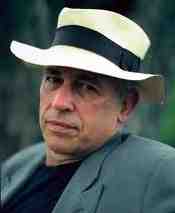164 Answers to One Question
By Peter LloydOne of the secrets to successful creative problem solving is asking the right questions. How much more important becomes creative questioning when grappling with the world’s biggest problems. They call for the biggest possible questions.
 Every year John Brockman poses one big question on his Edge website and invites big thinkers to answer it. Previous questions include: What is your dangerous idea? What have you changed your mind about? and What do you believe is true even though you cannot prove it?
Every year John Brockman poses one big question on his Edge website and invites big thinkers to answer it. Previous questions include: What is your dangerous idea? What have you changed your mind about? and What do you believe is true even though you cannot prove it?The 2011 question: What scientific concept would improve everybody’s cognitive toolkit? It has attracted 164 answers. Below I’ve listed those that intrigue me most. The ones that address innovation, invention, creativity, creative thinking, critical thinking, and problem solving.
Innovation
Laurence C. Smith
Professor of Geography and Earth & Space Sciences, UCLA
Author of The World in 2050: Four Forces Shaping Civilization’s Northern Future
Through innovation, we all can transcend social, professional, political, scientific, and most importantly, personal limits. Perhaps we might all put it to better and more frequent use.
The Snuggle For Existence
Roger Highfield
Editor, New Scientist
Coauthor of After Dolly
I doubt many realise that, paradoxically, one way to win the struggle for existence is to pursue the snuggle for existence: to cooperate.
Structured Serendipity
Jason Zweig
Journalist, Personal Finance Columnist, The Wall Street Journal
Author of Your Money and Your Brain
Creativity is a fragile flower, but perhaps it can be fertilized with systematic doses of serendipity...invest a few hours a week in reading research that ostensibly has nothing to do with our day jobs, in a setting that has nothing in common with our regular workspaces.
Fixed-Action Patterns:
Using The Study Of Animal Instinct As A Metaphor For Human Behavior
Irene Pepperberg
Psychologist, Research Associate, Harvard University
Author of Alex and Me
...if we wish to understand why as humans we often act in certain predictable ways, and particularly if there is a desire or need to change these behavioral responses, we can remember our animal heritage and look for the possible releasers that appear to stimulate our FAPs.
Randomness
Charles Seife
Professor of Journalism, New York University
Author of Proofiness
I would argue that only once we understand three dicta—three laws of randomness—can we break out of our primitive insistence on predictability and appreciate the universe for what it is rather than what we want it to be.
Think Bottom Up, Not Top Down
Michael Shermer
Publisher of Skeptic Magazine, Adjunct Professor, Claremont Graduate University
Author of The Believing Brain
For the past 500 years humanity has gradually but ineluctably transitioned from top down to bottom up systems, for the simple reason that both information and people want to be free.
The Uselessness of Certainty
Carlo Rovelli
Physicist, University of Aix-Marseille, France
Author of The First Scientist: Anaximander and the Nature of Science
There is a widely used notion that does plenty of damage: the notion of “scientifically proven.” Nearly an oxymoron. The very foundation of science is to keep the door open to doubt.
We are Lost in Thought
Sam Harris
Neuroscientist, Chairman, Project Reason
Author of The Moral Landscape
If we want to actually understand the mind and overcome some of the most dangerous and enduring sources of conflict in our world, we must begin thinking about the full spectrum of human experience in the context of science.
Cognitive Humility
Gary Marcus
Cognitive Scientist, NYU
Author of Kluge: The Haphazard Evolution of the Human Mind
...human beings tend almost invariably to be better at remembering evidence that is consistent with their beliefs than evidence that might disconfirm them.
Free Jazz
Adrian Kreye
Editor, The Feuilleton (Arts and Essays), of the German Daily Newspaper, Sueddeutsche Zeitung, Munich
It’s always worth to take a few cues from mid-20th-century avant-garde. So when it comes to improving your cognitive toolkit Free Jazz is perfect.
Collective Intelligence
Matt Ridley
Science Writer, Founding chairman of the International Centre for Life
Author of Francis Crick: Discoverer of the Genetic Code
The key to human achievement is not individual intelligence at all. The reason human beings dominate the planet is not because they have big brains... Human achievement is entirely a networking phenomenon.
Open Systems
Thomas A. Bass
Professor of English at the University at Albany
Author of The Spy Who Loved Us
Open standards allow knowledgeable outsiders access to the design of computer systems, to improve, interact with, or otherwise extend them. These standards are public, transparent, widely accessible, and royalty-free for developers and users.
The Virtues of Negative Results
Kevin Kelly
Editor-At-Large, Wired
Author of What Technology Wants
We can learn nearly as much from an experiment that does not work as from one that does. Failure is not something to be avoided but rather something to be cultivated. That’s a lesson from science that benefits not only laboratory research, but design, sport, engineering, art, entrepreneurship, and even daily life itself. All creative avenues yield the maximum when failures are embraced.
That’s just 13, but I’m out of space. You will find these and 151 more essays on Edge. Every one worth a look.
Peter Lloyd is co-creator with Stephen Grossman of Animal Crackers, the breakthrough problem-solving tool designed to crack your toughest problems.
171 Right Brain Workouts are available in the 134-page paperback Right Brain Workouts: Aerobic Exercises for the Creative Side of Your Brain.
